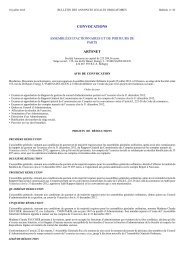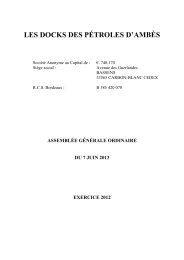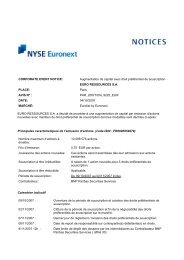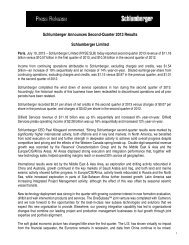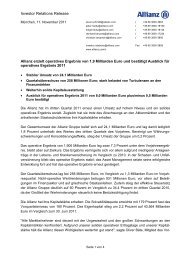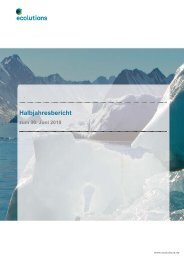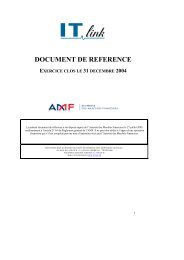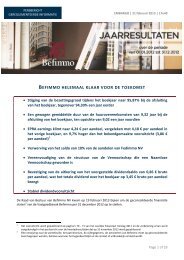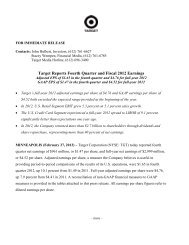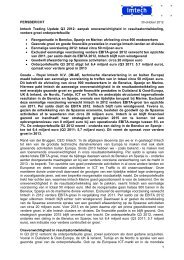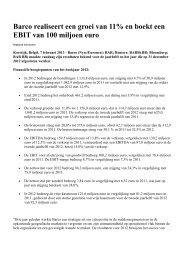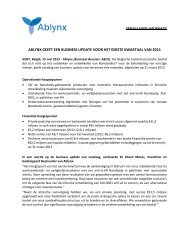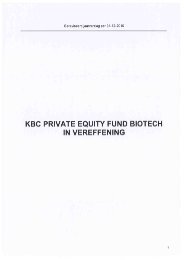Euro 6,000,000,000 Euro Medium Term Note Programme Due from ...
Euro 6,000,000,000 Euro Medium Term Note Programme Due from ...
Euro 6,000,000,000 Euro Medium Term Note Programme Due from ...
Create successful ePaper yourself
Turn your PDF publications into a flip-book with our unique Google optimized e-Paper software.
1.4 Modification, waivers and substitution<br />
The conditions of the <strong>Note</strong>s contain provisions for calling General Meetings of <strong>Note</strong>holders to consider<br />
matters affecting their interests generally. These provisions permit defined majorities to bind all <strong>Note</strong>holders<br />
including <strong>Note</strong>holders who did not attend and vote at the relevant General Meeting and <strong>Note</strong>holders who<br />
voted in a manner contrary to the majority.<br />
1.5 A <strong>Note</strong>holder’s actual yield on the <strong>Note</strong>s may be reduced <strong>from</strong> the stated yield by transaction<br />
costs<br />
When <strong>Note</strong>s are purchased or sold, several types of incidental costs (including transaction fees and<br />
commissions) are incurred in addition to the current price of the security. These incidental costs may<br />
significantly reduce or even exclude the profit potential of the <strong>Note</strong>s. For instance, credit institutions as a<br />
rule charge their clients for own commissions which are either fixed minimum commissions or pro-rata<br />
commissions depending on the order value. To the extent that additional – domestic or foreign – parties are<br />
involved in the execution of an order, including but not limited to domestic dealers or brokers in foreign<br />
markets, <strong>Note</strong>holders must take into account that they may also be charged for the brokerage fees,<br />
commissions and other fees and expenses of such parties (third party costs).<br />
In addition to such costs directly related to the purchase of securities (direct costs), <strong>Note</strong>holders must also<br />
take into account any follow-up costs (such as custody fees). Investors should inform themselves about any<br />
additional costs incurred in connection with the purchase, custody or sale of the <strong>Note</strong>s before investing in the<br />
<strong>Note</strong>s.<br />
1.6 Taxation<br />
Potential purchasers and sellers of the <strong>Note</strong>s should be aware that they may be required to pay taxes or other<br />
documentary charges or duties in accordance with the laws and practices of the country where the <strong>Note</strong>s are<br />
transferred or other jurisdictions. In some jurisdictions, no official statements of the tax authorities or court<br />
decisions may be available for the <strong>Note</strong>s. Potential investors are advised not to rely upon the tax summary<br />
contained in this Base Prospectus but to ask for their own tax adviser’s advice on their individual taxation<br />
with respect to the acquisition, sale and redemption of the <strong>Note</strong>s. Only these advisers are in a position to<br />
duly consider the specific situation of the potential investor. This risk factor has to be read in connection<br />
with the taxation sections of this Base Prospectus and in the additional tax sections, if any, contained in any<br />
relevant supplement to the Base Prospectus.<br />
1.7 The proposed financial transactions tax<br />
The <strong>Euro</strong>pean Commission recently published a proposal for a Directive for a common financial transaction<br />
tax (the "FTT") in Belgium, Germany, Estonia, Greece, Spain, France, Italy, Austria, Portugal, Slovenia and<br />
Slovakia. The tax would be applicable <strong>from</strong> 1 January 2014.<br />
The proposed FTT has very broad, potentially extraterritorial scope. It would apply to financial transactions<br />
where at least one party is a financial institution, and (a) one party is established in a participating Member<br />
State or (b) the financial instrument which is subject to the transaction is issued in a participating Member<br />
State. A financial institution in the meaning of the proposal for a Directive for a FTT encompasses a wide<br />
range of entities, including certain credit institutions but also, inter alia, certain regulated markets, UCITS,<br />
AIF, securitisation vehicles and individuals. A financial institution may be, or be deemed to be, "established"<br />
in a Member State in a broad range of circumstances.<br />
The Issuer is incorporated in France and therefore financial institutions worldwide would be subject to the<br />
FTT when dealing in the <strong>Note</strong>s.<br />
In relation to many secondary market transactions in bonds and shares, the FTT would be charged at a<br />
minimum rate of 0.1 per cent. on each financial institution which is party to the transaction. The issuance<br />
7



